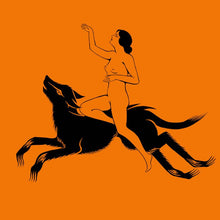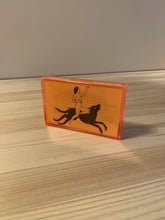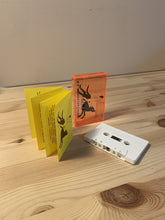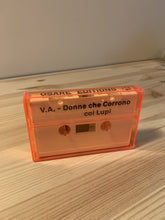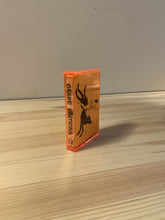
Osàre! Editions / Netherlands / 2021 / CS
Inspired by Clarissa Pinkola Estés canonical text, Women Who Run with the Wolves (1992), the eponymously titled Donne che corrono coi lupi is a dedication to feral feminine energy, connection and sisterhood. In the book, Estés – a psychoanalyst, poet and cantadora, or “keeper of old stories” – draws on Jungian theory to weave an alternative mythology of The Wild Woman archetype. She conjures images of the underworld, rivulets of menstrual blood; a lumpen mass of placenta splattering onto a cave floor. In a mirrored gesture, for Donne che corrono coi lupi, more than twenty artists and producers have come together, giving rise to a primal, mystical compilation destined to entrance and ensnare.
An eerie lullaby, Cucina Povera’s ‘Liikaa liimaa’ recants her trek through Glasgow’s Victorian Necropolis, a gigantic cemetery comprised of elaborate tombs and monuments. Searching for some healing growth during the bleak Scottish winter, she wandered among the graves, coming face to face with an elusive herd of deer. Translating this encounter into sound, Povera’s ethereal vocals glide and glissade, taking on the malleability of melting ice. Another eulogy to animals in the landscape, Kakubo’s ‘Aboyá’ derives from the Brazilian Portuguese word “Aboiar” – a chant utilised by farmers to herd cattle. The sloping beat is interlaid with synthetic horns and Brazilian folk songs, traditional compositions made by marginalised rural communities.
Camille Mandoki and Lucrecia Dalt’s contribution is named after the ancient Greek goddess – Baubo is a fearsome, headless torso, who appears with nipples for eyes and a vulva for a mouth. In Estés’ envisioning, Baubo is a gloriously obscene character who shakes her breasts and tells hilarious dirty jokes. Her nipples are described as “psychic organs,” with the vulva becoming an endless portal to women’s stories and secrets. On the track, developed during a virtual artist residency at the Goethe Institut, Mandoki and Dalt experiment with timbre, creating the uncanny, spectral presence of a third singer. Voices are an essential component throughout Donne che corrono coi lupi, harmonising and unifying, refusing to be silenced. Eva Geist, in her native Italian tongue processed through a multitude of fx pedals, casts spells – incantations to honour the power of female friendship. While label boss Elena Colombi, utilising Ece Özel’s hypnotic reading of the parable of The Red Shoes and Pirinç by Turkish poet Lale Müldür, summons dissociative glossolalia.
In defiance of the punitive rationality that structures the domesticated world, Estés instead holds reverence for intuition – wild impulses generated from one’s body and soul. Bergsonist – whose alias references Bergsonism, a school of philosophical thought which rejects static values in favour of motion and change – records almost all her music live. ‘Speculation’ is an improvised piece, instinctively composed in the heat of the moment.
Percussionist Valentina Magaletti’s ‘Bubble Pain’ seethes like a boiling cauldron, her rapid, heart-fluttering rhythms inflected with bat screeches and canine yelps.
Borusiade – a stalwart figure in Romania’s queer dance community – unleashes ‘Our Hustle,’ the title referring to the urgency of gaining “an equal status in society.” A powerful industrial affair, the track sways with mechanic momentum. Also tuning into cyborg fantasies, Isabella, alone in the midst of the pandemic, conducts a seance with her Elektron Octatrack – ’Cherry Sky’ blends mechanical synth with sticky-sweet lyrics. Otherwise known as Inga Copeland, Lolina takes a bath with a drum machine, its waterlogged utterances meandering over her disquieting refrain: “Let me drown in sound.”
Closing off the B-side, ‘Dali's Elephant Caravan Melting Desert’ is a recording of a performance held in a former brothel – perhaps the oldest – in Hudson, New York. Emulating the motion of a train thundering past the building, Deradoorian encapsulates the dynamism of the city, its ghosts and obscured history of labouring sex workers. Reaching climax, the record concludes with Fetter’s ‘Karma’ – a cacophony of raucous punk-noise, exploding into incandescent fragments as sharp as broken glass.





